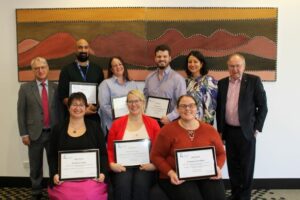On 23 May 2023, the Foundation Board was pleased to present this year’s Weary Dunlop grants in what was a very competitive field of applications. The 2023 grant recipients are:
Dr Laura Vella, Research Fellow, Florey Department of Neuroscience and Mental Health, The University of Melbourne – Grant Application: Identifying and targeting drivers of exosome mediated spread of glioblastoma
Glioblastoma is an aggressive brain cancer that can be related to relevant service by veterans. No significant treatment advances have been made in the last 25 years, and prognosis remains very poor (median survival of less than 15 months). This project aims to improve prognosis with a personalized therapeutic approach.
Dr Jarmon Lees, Senior Research Officer (Postdoc), O’Brien Institute Department, St Vincent’s Institute of Medical Research – Grant Application: Testing new treatments for heart attack using human cardiac organoids
Ischemic heart disease, or a heart attack, is the leading cause of death worldwide, for veterans, their families, the military, and the general population. This project will identify new treatments for ischemic heart disease using a sophisticated model of human heart tissue in a dish.
Dr Varun Venkatesh, Research Fellow, Department of Medicine, University of Melbourne, Austin Health – Grant Application: Determining the importance of aromatase activity in bone: a new potential target for osteoporosis therapy.
1-in-3 women and 1-in-5 men aged >50 will suffer a fracture due to osteoporosis and this risk is higher in female veterans compared to non-veterans. We will determine the effects of sex hormones in controlling bone strength at the microscopic level to help develop new treatments to prevent fractures and improve quality of life.
Dr Katrina Binger, Senior Lecturer / Lab Head (Teaching & Research), Department of Biochemistry and Chemistry, La Trobe Institute for Molecular Science (LIMS) – Grant Application: Targeting the vitronectin-CD38 axis to treat high blood pressure.
“Macrophages” are the key immune cell that causes blood vessels to stiffen and increase blood pressure, leading to cardiovascular disease. In this research proposal we will test if drugs that block the activity of a newly identified protein (CD38) are effective at reducing macrophage dysfunction and blood pressure.
Dr Monica Langiu, Research Fellow, Monash Institute of Pharmaceutical Science, Monash University (MENTAL HEALTH GRANT) – Grant Application: Investigation of sex-dependent signaling of novel cognition-enhancers
Memory and cognitive impairments heavily affect veterans. New drugs are needed to treat cognitive deficits. This project aims to understand the sex-specific molecular properties of different cognition-enhancers modulating glutamate receptor. This project is the first step to a better understanding of how best to target glutamate receptors for therapeutic effect.
Dr Barbara Fam White, Senior Research Fellow, Department of Medicine, University of Melbourne, Austin Health (DIABETES GRANT) – Grant Application: The adaptive immune system and diabetic kidney disease – what role does it play?
Diabetes and its complications (DKD) do not discriminate and affects everyone from the general-public to our veteran communities and their families. Inflammation plays a significant role in the development of DKD. We propose that the adaptive immune system is a key driver and using pre-clinical mouse models, we will identify the specific cell types involved and the sequence of when these changes occur. These findings will provide information on potential druggable targets has the potential to reverse or stem DKD development.
Jeffrey D. Zajac
Chairman, Medical & Scientific Research Committee
“Weary” Dunlop Medical Research Foundation
Back (L-R) Prof. Jeffrey Zajac, Dr Varun Venkatesh, Dr Laura Vella, Dr Jarmon Lees, Prof Elif Ekinci, Robert Winther
Front (L-R) Dr Monica Langiu, Dr Katrina Binger, Dr Barbara Fam White

